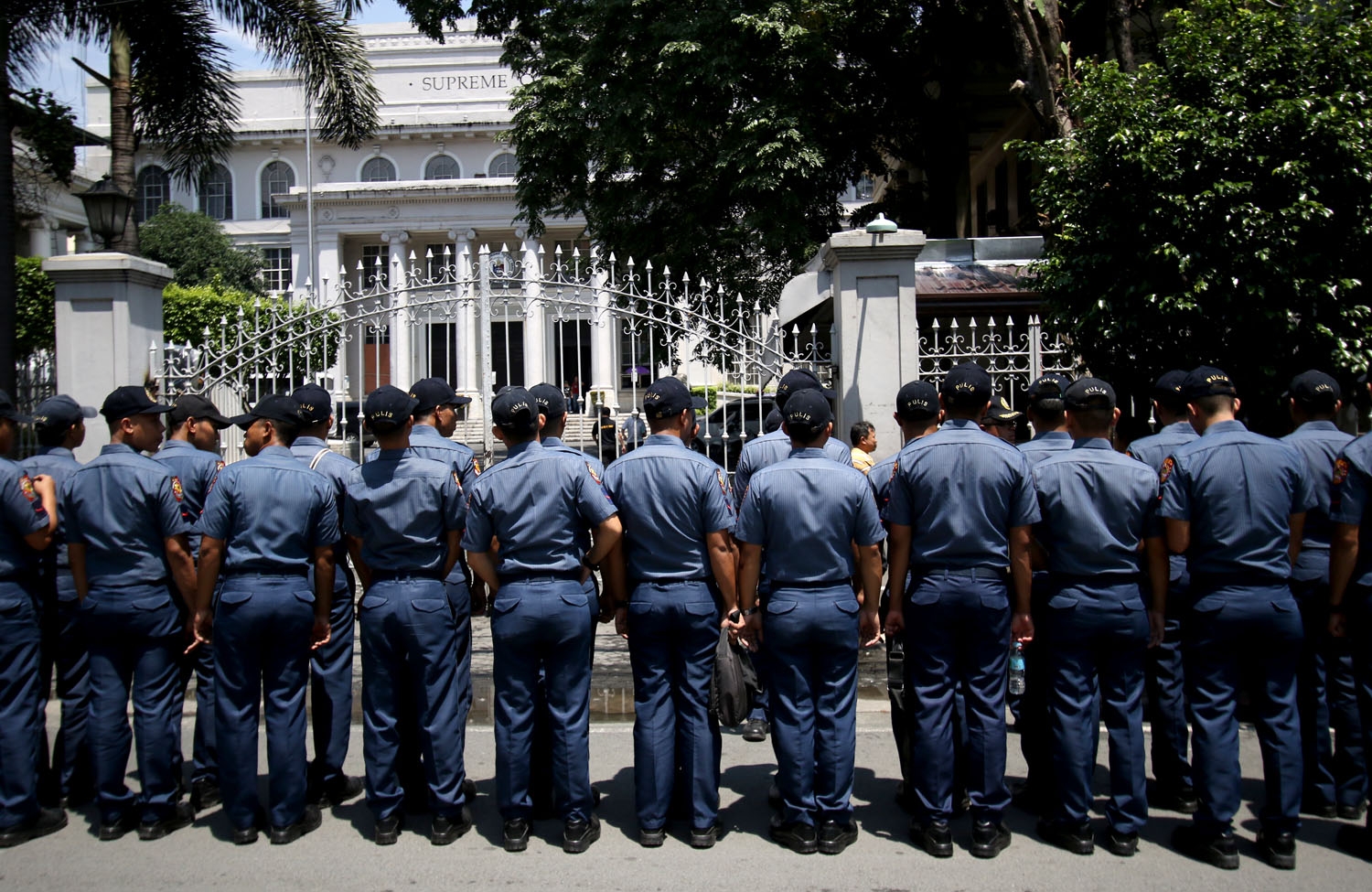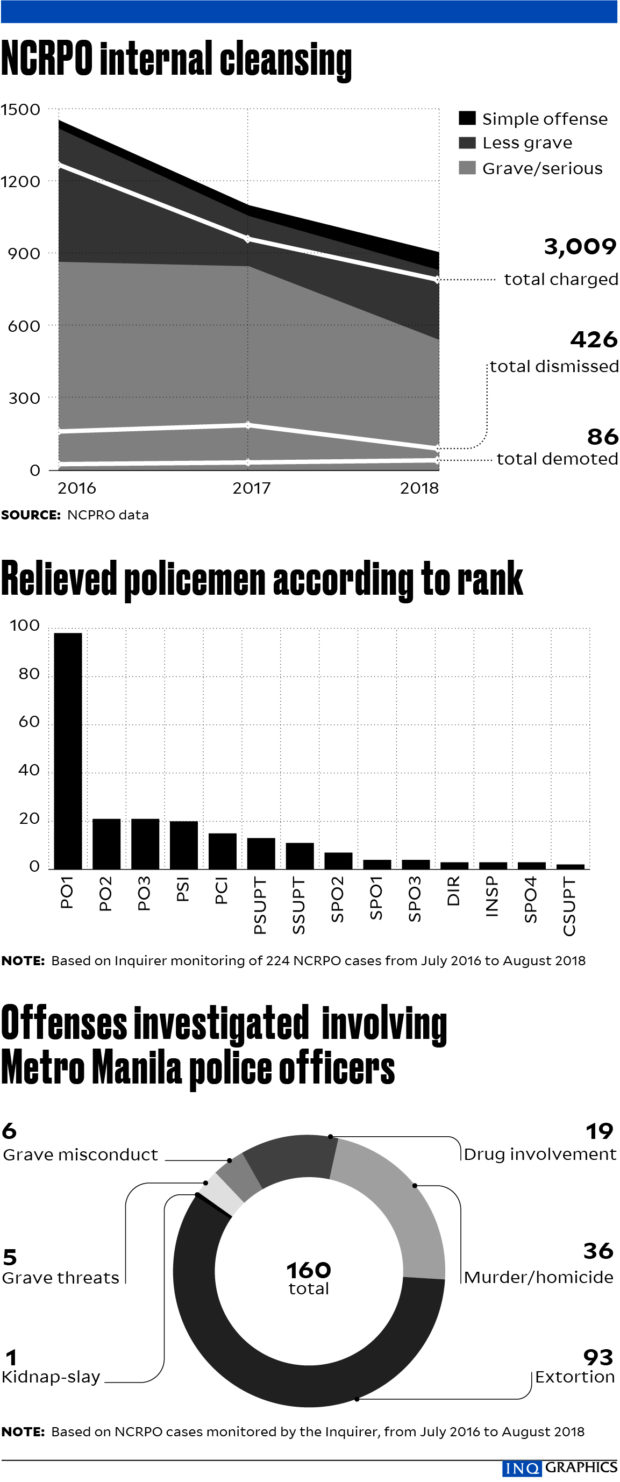PO1s as drug war pawns: Reproved, relieved, ‘recycled’
(First of two parts)
Public fury came swiftly for Caloocan police when Kian delos Santos, 17, was shot dead on a riverside alley at Barangay 160 on Aug. 17, 2017, in an operation riddled by suspicions of police brutality.
The brunt of that anger was felt fiercest by the Santa Quiteria precinct as accountability for the operation ultimately fell on 15 of its men and three of its superiors.
But an understated element in Kian’s case was that 12 of the implicated cops were police officers 1. This also defines nearly all questionable operations under President Duterte’s crackdown on drugs and ordinance violators in Metro Manila, the hotbed of the killings and arrests.
Most of the tagged members of the Philippine National Police said they were not present during the fatal operations, like PO1 Myrldon Yagi. At the time of Kian’s killing, he said, he was wire-transferring loaned money in Monumento with PO1 Ronald Herrera, who was also implicated.
Yagi testified as much at the Department of Justice before it indicted his three colleagues, PO3 Arnel Oares, PO1 Jerwin Cruz and PO1 Jeremias Pereda, for murder, torture and frame-up.
He was expectedly terrified, Yagi said. “Just because of the blunders of a few …” he said, then changed tack: “Just because of that operation. It’s unfair. Not everyone made a mistake. Not everyone was there.”
Still, they had it easy. Despite PNP Director General Oscar Albayalde’s public assurance of “self-cleansing” against “scalawags,” all 12 were not relieved of their posts even while under investigation. They were disarmed only in September 2017 and slapped with administrative charges only in March.
All are now back in active duty. Yagi has been reassigned to Galas Station in Quezon City, Herrera in Valenzuela, and the others in various assignments in Metro Manila. Only Oares, Pereda and Cruz are in jail.
It’s called due process for erring cops in the face of thousands killed in dubious circumstances across the Metro.
Immediate recourse
Administrative relief, or removal from one’s post, has been a hallmark punitive measure for policemen since Mr. Duterte took office.
It’s the immediate recourse before the formal investigation of a cop accused of an offense, said Director Guillermo Eleazar, who heads the 27,000-strong National Capital Region Police Office (NCRPO).
Administrative charges are integral to the PNP’s self-cleansing process especially as it leads Mr. Duterte’s campaign against drugs, Eleazar told the Inquirer. So when a cop is accused of committing an offense, she or he is immediately reassigned to the regional headquarters to do community service while investigation is ongoing.
“But you are still a policeman,” Eleazar said, “with salary and benefits, just without a post.”
Being relieved, while part of due process, is not punishment, the NCRPO chief said. It is more of an assurance that erring police would not interfere with investigations.
It’s apparently also why most of them return to active duty with barely a slap on the wrist while awaiting verdict. Often, charges are dropped for lack of evidence or procedural technicalities.
NCRPO figures show that at least 3,500 policemen have been administratively charged since January 2016, two-thirds for serious offenses such as extortion and grave neglect of duty.
Of these, only around 500 were eventually dismissed or demoted. The others remain either on active duty or on floating status.
The NCRPO is willing to reassign accused cops as long as they have not been proven guilty beyond reasonable doubt.
Said Eleazar: “When you are relieved [of your post], you are not immediately assumed to have done a crime. Sometimes you know that policeman is a good man, pero minalas lang (but had bad luck). It’s within my discretion to bring him back. If he fails, the buck stops with me.”
Newbie cops
To understand the patterns of relief across Metro Manila, the Inquirer studied the cases of some 200 identifiable cops.
This was what emerged: a picture of a deeply hierarchical institution where the bad eggs are too often newbie cops—foot soldiers—while the superiors from whom they take orders are held to completely different standards.
A clear trend was that most of those relieved were often PO1s like Yagi.
This may be indicative of a “serious deficit in enforcing rules within the PNP [as] rookie cops are often the easiest to eliminate from the force,” observed Carlos Conde of Human Rights Watch.
But Eleazar viewed it as the inevitable outcome of an oversupply of rookie cops.
Nearly half of the entire PNP is made up of PO1s, the lowest of the 16 police ranks. As the frontliners, they are also the ones most likely to interact with the public.
But flawed internal screening and recruitment processes for rookies, as well as lapses in their training, might have also helped reinforce an ethos of impunity and abuse.
Most face grave misconduct charges, often drug-related. These involve allegations of personal involvement in the narcotics trade or, perhaps more alarmingly, extortion of drug suspects.
More than half of all the relieved cops in this study also came from the Northern Police District, a prime hot spot in the war on drugs, mostly for drug-related charges.
An example is the case of PO1 Emerson Santillan and PO1 John Paul Bautista of the Camarin precinct, who were relieved in February. According to the PNP antiscalawag unit, they tried to extort an amount from Joel Manansala, whom they had arrested for using “shabu” (crystal meth), in exchange for his freedom.
Such dubious arrests are common in the war on drugs, as Mr. Duterte has virtually given police the go-signal to use whatever means necessary to enforce the campaign.
Mistaken identity
But although the PNP doubled down on drug suspects, those relieved of their posts for operations resulting in deaths accounted only for 5 percent of all sacked Metro policemen.
This is partly because the PNP presumes regularity in deaths during operations, Eleazar said. Even otherwise, bereaved families rarely file charges against police.
Most of those relieved since 2016 were PO1s tagged in the deaths of young people such as Kian, Carl Arnaiz and Reynaldo de Guzman.
Others displayed lapses in operational procedures by shooting indiscriminately at targets, like the 10 cops involved in the “mistaken identity” rubout in Mandaluyong City in December 2017. Eight of them were rookies.
They rained bullets on a van they were chasing at Barangay Addition Hills after they were “fed” false information by two village officials that the vehicle was transporting suspects from a previous shooting incident.
In the process, they killed two of the van’s passengers including the then critically wounded Jonalyn Ambaon, the victim of the real gunmen.
But while the 10 cops were relieved, disarmed and charged with double homicide in courts, all were out on bail and back in active duty within six months.
Recycling
This culture of “recycling” scalawags not only retards public trust in the PNP but also undermines its integrity, warned Ronaldo Mendoza, dean of Ateneo School of Government.
Mendoza, who coheaded the launch of The Drug Archive, an academe-initiated research into the war on drugs, said this could also weaken the commitment of other officials to promote the rule of law.
“This has to stop if these agencies are to send a strong message that impunity and corruption will not be tolerated,” he said.
Eleazar admitted that there was much to be done to ensure genuine accountability within their ranks.
After all, he said, the buck stops with men like him: the PNP’s big guns.

